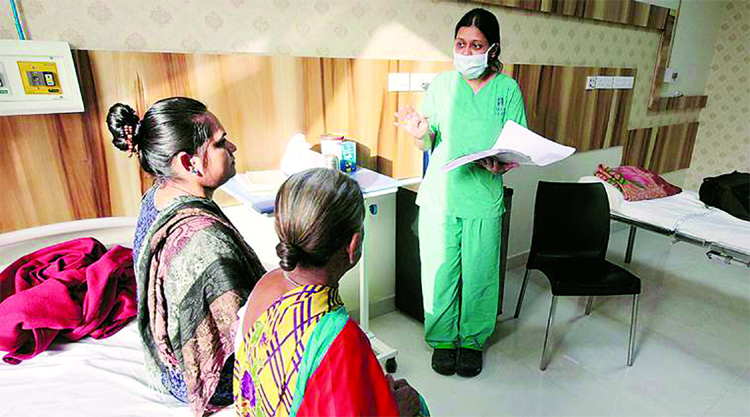
Weekend Plus Desk :
hile people and the medical fraternity have, until now, mostly associated the uterus with pregnancy and female hormones, in a recent study, researchers have found that the uterus may play a role in memory and cognition.
A third of women in the US have their uterus removed by the age of 60, according to Heather Bimonte-Nelson, who directs Arizona State University’s behavioral neuroscience of memory and ageing lab and is senior author of a new paper detailing the research.
The study conducted at Arizona State University in Tempe may soon alter the way this female reproductive organ is looked at.
As per Bimonte-Nelson, removing one’s uterus has a definite impact on spatial memory.
The uterus, being connected to the autonomic nervous system, which coordinates unconscious functions like breathing and digestion, plays a more important role than what meets the eye. While researchers have long studied the way the ovaries interact in the body and with the brain, they wanted to know if there is a definitive and direct link between the two organs.
“People talk a lot about the ovary-brain connection because we know now that estrogen and progesterone have such marked effects on things like memory. But we hope that scientists will start thinking about the uterus-ovary-brain system instead of just the ovary-brain system,” said Bimonte-Nelson.
The research team systematically tested the role of the uterus and ovaries in learning and memory in four groups each consisting of 14 or 15 rats. One group underwent a fake surgery in which no organs were removed. The remaining three groups underwent either removal of the uterus, removal of the ovaries, or removal of both uterus and ovaries.
After 6 weeks, the investigators trained all the rats to navigate a complex maze structure and found that, interestingly, female rats that had undergone hysterectomies found it more challenging to navigate the maze than the others.
“When the second study results had the same effect and the same pattern was there, we knew that we had hit on something important,” Bimonte-Nelson said.
“No matter how we looked at it, the data were telling us that removing the uterus was impacting cognition.”
hile people and the medical fraternity have, until now, mostly associated the uterus with pregnancy and female hormones, in a recent study, researchers have found that the uterus may play a role in memory and cognition.
A third of women in the US have their uterus removed by the age of 60, according to Heather Bimonte-Nelson, who directs Arizona State University’s behavioral neuroscience of memory and ageing lab and is senior author of a new paper detailing the research.
The study conducted at Arizona State University in Tempe may soon alter the way this female reproductive organ is looked at.
As per Bimonte-Nelson, removing one’s uterus has a definite impact on spatial memory.
The uterus, being connected to the autonomic nervous system, which coordinates unconscious functions like breathing and digestion, plays a more important role than what meets the eye. While researchers have long studied the way the ovaries interact in the body and with the brain, they wanted to know if there is a definitive and direct link between the two organs.
“People talk a lot about the ovary-brain connection because we know now that estrogen and progesterone have such marked effects on things like memory. But we hope that scientists will start thinking about the uterus-ovary-brain system instead of just the ovary-brain system,” said Bimonte-Nelson.
The research team systematically tested the role of the uterus and ovaries in learning and memory in four groups each consisting of 14 or 15 rats. One group underwent a fake surgery in which no organs were removed. The remaining three groups underwent either removal of the uterus, removal of the ovaries, or removal of both uterus and ovaries.
After 6 weeks, the investigators trained all the rats to navigate a complex maze structure and found that, interestingly, female rats that had undergone hysterectomies found it more challenging to navigate the maze than the others.
“When the second study results had the same effect and the same pattern was there, we knew that we had hit on something important,” Bimonte-Nelson said.
“No matter how we looked at it, the data were telling us that removing the uterus was impacting cognition.”

